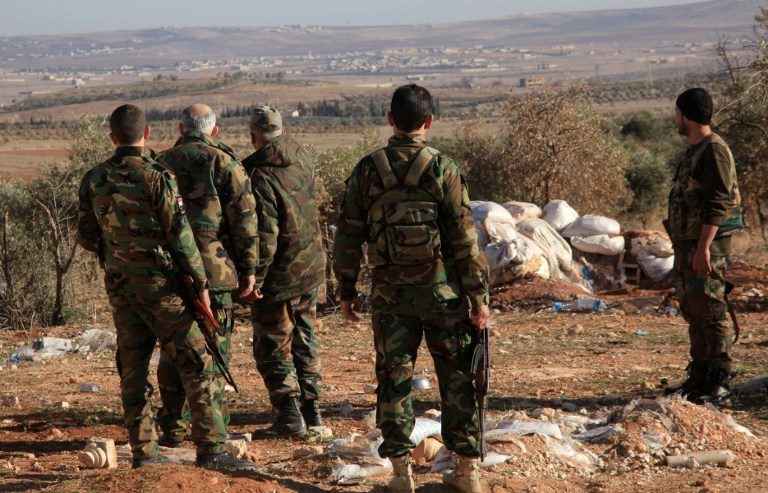SUMMARY
This is AI generated summarization, which may have errors. For context, always refer to the full article.

BEIRUT, Lebanon – Syria’s regime said Thursday, December 24 it was ready to take part in new talks in Geneva aimed at ending the war, but appeared to make its participation conditional on which opposition groups attend.
Foreign Minister Walid Muallem said Damascus “is ready to participate in the Syrian-Syrian dialogue in Geneva without any foreign interference”.
Last week, the UN Security Council unanimously adopted a resolution endorsing a proposed peace plan to bring the regime and opposition together for talks in January.
The plan is the result of nearly two months of strenuous efforts among top diplomats from 17 countries, including regime backers Russia and Iran.
But it does not address the sharpest difference between opposition groups and the regime: the fate of President Bashar al-Assad.
Muallem’s comments seemed to indicate government approval of the plan – but with apparent preconditions.
Syria had rejected “foreign interference”, and the government’s negotiating team “will be ready as soon as we receive a list of the opposition delegation”, he said.
On the ground, regime air raids killed 10 children among 28 civilians in the rebel-held area of Eastern Ghouta near Damascus, said a monitor.
Islamic State (IS, formerly known as ISIS or the Islamic State in Syria and Iraq) group jihadists meanwhile pushed further into a key eastern city in fighting that reportedly left more than two dozen loyalists dead.
Syria awaits ‘terrorist’ list
Muallem said Syria was waiting to receive a list of “terrorist organizations” that would not be allowed to participate in the talks.
The UN tasked Jordan with creating the blacklist, which was submitted Friday and apparently included ISIS and the Al-Qaeda-linked Al-Nusra Front.
Syria’s government has systematically referred to all its opponents, including non-Islamist groups, as “terrorists”.
A landmark summit in Saudi Arabia earlier this month saw armed and political branches of the opposition agree to talks with Assad’s government.
An opposition delegation to future peace negotiations is expected to include the factions present in Riyadh, as well as other groups on the ground in Syria.
The UN resolution calls for talks in early January that would lead to the “establishment of an inclusive transitional governing body with full executive powers” within 6 months. (READ: Arab League backs UN plan to end Syria war)
But Muallem referred only to an eventual “national unity government”.
He said Damascus would “compose a constitutional committee to look for a new constitution with a new law of election so the parliamentary election will be held within the period of 18 months, more or less”.
The UN resolution was received coolly by Syrian opposition forces, including the main group in exile, the Istanbul-based National Coalition.
Previous efforts to negotiate a political solution to the nearly 5-year conflict have faltered, including the 2014 Geneva talks between the regime and opposition forces.
ISIS advances in east
It is the danger posed by ISIS that saw world powers redouble efforts to contain Syria’s civil war, which has killed more than 250,000 people.
The extremist organization has overrun swathes of territory across Syria, and Iraq, declaring a self-styled caliphate governed by a literal interpretation of Islamic law.
Late Wednesday, December 23, ISIS fighters seized another neighborhood in the eastern city of Deir Ezzor, strengthening their position in the oil-rich province.
The operation began when 3 suicide bombers drove explosive-laden cars into the city’s industrial neighborhood, killing at least 11 pro-regime fighters, the Observatory said.
The ensuing “violent clashes, air strikes, and an exchange of shelling” brought the toll up to 26 government loyalists and 15 ISIS militants, including the suicide bombers, it said.
ISIS has been fighting for months to fully capture the city and its military airport.
If the city falls, it would be the second provincial capital under the extremist group’s control, after Raqa in the north.
Kurdish militia and Arab rebel groups have been chipping away at ISIS territory near Raqa, the jihadist organization’s de facto Syrian capital.
On Thursday, an alliance of Kurdish and Arab rebels drove ISIS fighters back on the eastern bank of the Euphrates River in the northern province of Aleppo, its spokesman told AFP. – Rappler.com
Add a comment
How does this make you feel?
There are no comments yet. Add your comment to start the conversation.